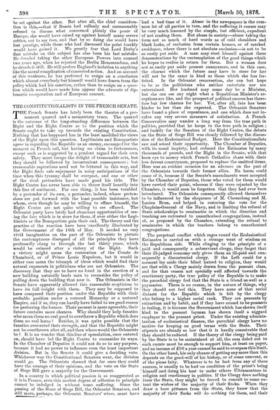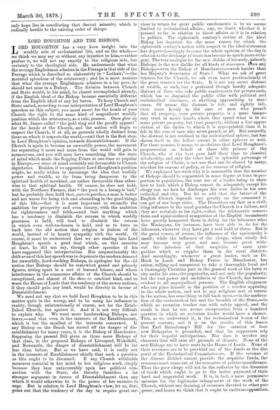THE CONSTITUTIONALISTS IN THE FRENCH SENATE.
THE French Senate has lately been the theatre of a per- manent quarrel and a momentary truce. The quarrel- is the outcome of the long-standing difference between the Right and the Right Centre as to the position which the Senate ought to take up towards the existing Constitution. Nothing that has happened has in the least modified the views of the Right upon this question. Legitimists and Bonapartists agree in regarding the Republic as an enemy, encamped for the moment on French soil, but having no claim to forbearance, except such as is suggested by a prudent regard for their own safety. They must forego the delight of treasonable acts, lest they should be followed by inconvenient consequences ; but treasonable aspirations need not be fettered in this way, and the Right finds safe enjoyment in noisy anticipations of the time when this tyranny shall be overpast, and one or other of the rival pretenders have made good his title. The Right Centre has never been able to throw itself heartily into this line of sentiment. For one thing, it has been troubled by a pretender of its own, a pretender, indeed, whose preten- sions are put forward with the least possible insistence, but whom, even though he may be willing to efface himself, the Right Centre are not quite willing to see effaced. The Orleanist party have lately had abundant opportunities of see- ing the fate which is in store for them, if ever either the Legi- timists or the Bonapartists gain their end. The theory and the practice of the reaction have been' excellently illustrated by the Government of the 16th of May. It needed no very vivid imagination on the part of the Orleanists to picture the contemptuous disregard of all the principles they have professedly clung to through the last thirty years, which would be evinced after a victory of the Right. Such a • victory might mean the restoration of the Comte de Chambord, or of Prince Louis Napoleon, but it would in either case mean the triumph of ideas which would find their natural exponents in politicians who are not Orleanists. The discovery that they are to have no hand in the erection of a. new building naturally leads men to reconsider the policy of pulling down the building that now is. The Orleanists in the Senate have apparently allowed this reasonable scepticism to have its full weight with them. They may be supposed to have compared their position under the Republic with their probable position under a restored Monarchy or a restored Empire, and if so, they can hardly have failed to see good reason for preferring the former. Their present is more agreeable, their future contains more chances. Why should they help fanatics who mean them no real good to overthrow a Republic which does them no real harm ? Besides, it was quite possible that the fanatics over-rated their strength, and that the Republic might not be overthrown after all, and then where would the Orleanists be ? It is no wonder that this line of speculation, once entered on, should have led the Right Centre to reconsider its ways. In the Chamber of Deputies it could not do so to any purpose, because it had no power to influence even the least important division. But in the Senate it could give a deciding vote. Whichever way the Constitutional Senators went, the division would go. The Orleanists showed that for once they could have the courage of their opinions, and the vote on the State of Siege Bill gave a majority for the Government.
In a country in which political passion is so exaggerated as it is in France, even this modest degree of adhesion to principle cannot be indulged in without some suffering. Since the passing of the State of Siege Bill, the Orleanist Senators, and still more, perhaps, the Orleanist Senators' wives, must have had a bad time of it. Abuse in the newspapers is the com- mon lot of-• all parties in turn, and the suffering. it causes may be very much lessened by the simple, but efficient, expedient of not reading them. But abuse in society—abuse taking the form not so much of hard words as -of cold shoulders and black looks, of exclusion• from certain houses, or of marked avoidance, where there is not absolute-exclusion—is not to be so easily put aside. A man may steel himself against these demonstrations by the contemplation of the good things which he hopes to realise in return for them. But a woman does not so easily put aside present annoyances, and in this case, the charms which the future may have in store for her will not be the same in kind as those which she has for- feited. In the Orleanist resurrection, she can but hope to be as the politicians who neither entertain nor are entertained. Her husband may some day be a Minister, but she can see any night what a Republican Minister's re- ceptions are like, and the prospect of political success has there- fore but few charms for her. Yet, after all, fate has been kinder to her than she expected. The Orleanist Senators have found a place of repentance, and one which does not in- volve any very severe measures of satisfaction. A French Conservative may wander a long way from the true path in politics, provided that he keeps to the true path in religion ; and luckily for the Senators of the Right Centre, the debate on the State of Siege Bill was closely followed by the discus- sion of the Ecclesiastical Budget. Here the Constitutionalists saw and seized their opportunity. The Chamber of Deputies, with its usual impiety, had reduced the Estimates by many thousands of pounds, and the Right in the Senate, with that keen eye to money which French Catholics share with their less devout countrymen, proposed to replace the omitted items. Here was an evident occasion for an advance on the part of the Orleanists towards their former allies. No harm could come of it, because if the Senate's amendments were accepted by the Chamber of Deputies, those who voted for them would have carried their point, whereas if they were rejected by the Chamber, it would soon be forgotten that they had ever been introduced. The Orleanists consequently allowed themselves to be influenced by the eloquence of M. Chesnelong and M. Lucien Brun, and • helped in restoring the vote for the Chaplain.General of the Navy, and in limiting the refusal of State scholarships to seminaries in which the direction and teaching are entrusted to unauthorised congregations, instead of, as proposed by the Chamber, extending the refusal to seminaries in which the teachers belong to unauthorised congregations.
The perpetual conflict which rages round the Ecclesiastical Estimates is carried on with a strange want of• wisdom. on the Republican side. While clinging to the principle of a paid and consequently a subservient clergy, they. forget that their ill-judged economy only gives them an ill-paid and con- sequently a discontented clergy. If the Left could for a moment-lay aside their blind hatred• to religion, they would see that with a Clergy mainly drawn from the peasant class, and for that-reason not specially well affected towards the reactionary party, the time policy of the Republic is to make the parochial 'clergy feel that the State is a friend aismell as a paymaster. There is no reason, in the nature of things, why they should not feel this. They have none of that social distaste for the Republic which is felt by the clergy who belong to a higher social rank. They are peasants by extraction and by habit, and if they have ceased to be peasants in feeling, it is because the Government which has shown itself kind to the peasant layman has shown itself a niggard employer to the peasant priest Under the existing adminis- tration of ecclesiastical finance, the parochial clergy have no motive 'for keeping on good terms with the State. Their stipends are already so low- that it is hardly conceivable that they should be reduced. If the theory of the clergy being paid by the State is to be maintained at all, the sum doled out to each curate must be enough to support him, at least on paper, and an income of £36 a year cannot be said to overpass this limit. On the other hand, his only chance of 'getting anymore than this depends on the good-will of his bishop, or- of some convent, or of the- pious laity. Whatever is to be had from any- of these sources, is usually to be had 'on condition of the priest's being himself 'and 'doing •his best to make' others Ultramontane in religion and reactionary in politics. If the Clergy drew nothing from the State, they might be forced to consult to-some ex- tent the wishes of the majority- of their flocks. When- they draw a bare pittance from the State, they know' that the majority of their flocks will do -nothing for them, and their only hope lies in conciliating that devout minority which is radically hostile to the existing order of things.



































 Previous page
Previous page